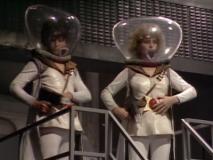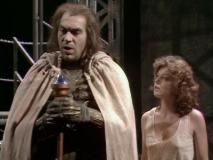BBC Chief: Dr Who is our creative future
Thursday, 18 January 2007 - Reported by Kenny Davidson
On the day when the BBC's Director General expressed real disappointment at the Government's final licence fee level settlement, which funds the corporation, he also gavea keynote speech on the BBC's creative future. Addressing The Future Of Creative Content Conference, part of the Media Summit 2007 event taking place in London, Mark Thompson gave a detailed lecture, but highlighted only one programme as an example of how the corporation was making its creative future a reality - Doctor Who. This part of his lecture is quoted below.
But it's incredibly important that we don't define "value" solely around productivity or cost-cutting. One of the fundamental lessons we learned from Creative Future was the value you can grow, the audiences you can build, when you think about projects not just in terms of single linear broadcast windows but across different platforms and media.
It will be much harder to justify very high budgets for content that only gets a single outing on a linear channel. But that's no longer the right way to think about content commissioning. In future major projects should extend not just across TV, the web, radio, and mobile but through multiple windows across time and across different business models.
So: Russell T Davies, Julie Gardner and BBC Wales build a brilliant sci-fi production factory to deliver Doctor Who. And when I say "factory" I don't just mean physical production, I mean ideas, development, brilliant scripts, design as well. A complete creative operation.
The factory of course makes even better creative and economic sense when you add Torchwood and The Sarah Jane Adventures. Doctor Who plays out across BBC and UKTV channels. The Torchwood website is not just commissioned on day one but is out there before the TV premiere. There's a coherent plan in place for the whole audience relationship with the content almost from the start.
Now clearly this kind of 360 degree exploitation could be creatively limiting or tawdry. Commercial priorities could distort the original commissioning intention. But it really hasn't been in this case and that's because we've had totally committed creative leaders at the centre of decision-making at every stage of the process. You'd have to talk to them directly to hear how they've found it, but my sense is that the sheer scale of the possibilities, the potential to link different titles and different platforms has been creatively inspiring and liberating.
It will be much harder to justify very high budgets for content that only gets a single outing on a linear channel. But that's no longer the right way to think about content commissioning. In future major projects should extend not just across TV, the web, radio, and mobile but through multiple windows across time and across different business models.
So: Russell T Davies, Julie Gardner and BBC Wales build a brilliant sci-fi production factory to deliver Doctor Who. And when I say "factory" I don't just mean physical production, I mean ideas, development, brilliant scripts, design as well. A complete creative operation.
The factory of course makes even better creative and economic sense when you add Torchwood and The Sarah Jane Adventures. Doctor Who plays out across BBC and UKTV channels. The Torchwood website is not just commissioned on day one but is out there before the TV premiere. There's a coherent plan in place for the whole audience relationship with the content almost from the start.
Now clearly this kind of 360 degree exploitation could be creatively limiting or tawdry. Commercial priorities could distort the original commissioning intention. But it really hasn't been in this case and that's because we've had totally committed creative leaders at the centre of decision-making at every stage of the process. You'd have to talk to them directly to hear how they've found it, but my sense is that the sheer scale of the possibilities, the potential to link different titles and different platforms has been creatively inspiring and liberating.

















